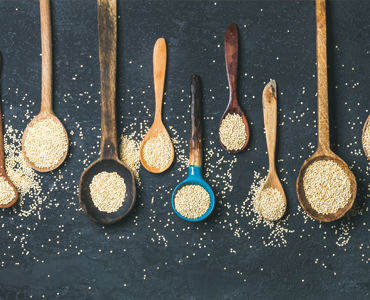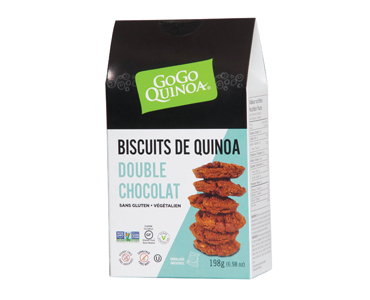
Man on a mission
By Mark Cardwell
Food Trends Health & Wellness Bake & Snack Food Specialty FoodsMartin Bilodeau of Montreal’s GoGo Quinoa wants to help more people discover the healthful qualities of quinoa

By Mark Cardwell
Montreal food entrepreneur Martin Bilodeau marvels at the size and space of the 45,000-sq.-ft. plant that his company moved into this summer in the Montreal suburb of Laval.
“It’s an amazing facility,” says Bilodeau, founder of Cie 2 Ameriks, a producer and importer of GoGo Quinoa, which includes more than 50 vegan, organic and gluten-free products made mostly from quinoa. “It will allow us to develop many more new products for the marketplace.” The company’s latest product – Super Grains Pasta, a nutrition-packed blend of chia, quinoa, sorghum and amaranth super grains – was launched in Costco stores in Eastern Canada in September. It will be rolled out in supermarkets and health food stores nationwide in November.
For Bilodeau, the new plant and growing product lines are crowning touches on his company’s mercurial rise to the top of a growing niche segment of the Canadian food market. It started in 2003 when Bilodeau, who was unhappy working in an office job in Montreal – but who had a young and growing family to support – decided to strike out on his own and start a company that would help people and turn a profit. “I wanted to do something that was close to my social values and that would make money too,” he recalls. “My idea was to do fair trade with food products that were good for people’s health. I was a man on a mission with a business plan.”
That quest led Bilodeau back to Bolivia, which he had visited a decade earlier during a backpacking trip through South America. He notably remembered eating quinoa, an Inca-era grain that poor farmers in the landlocked nation’s plateau region continue to cultivate and consume. “Quinoa is unique in that it offers a perfect blend of fibre, carbohydrates and complete plant-based protein, including the full range of amino acids,” says Bilodeau. “Unlike other protein grains, you could live your entire life eating just quinoa.”
Now in high demand for its multiple health benefits, quinoa was mostly unknown to Western consumers when Bilodeau  returned home with samples of the broadleaf plant’s grape-sized grains, which can be white, red or black. He took them to Quebec health food distributor Aux milles et une saison, now a subsidiary of Toronto-based SunOpta, and got a purchase order within minutes. “After that I took out a mortgage on my house and ordered a container,” says Bilodeau.
returned home with samples of the broadleaf plant’s grape-sized grains, which can be white, red or black. He took them to Quebec health food distributor Aux milles et une saison, now a subsidiary of Toronto-based SunOpta, and got a purchase order within minutes. “After that I took out a mortgage on my house and ordered a container,” says Bilodeau.
After obtaining fair trade certification for quinoa in Canada – becoming the first company in North America to do so – Bilodeau launched his GoGo Quinoa product line in both organic and fair trade in 2004.
Working from the basement of his mortgaged home, Bilodeau spent the next few years selling three SKUs of 500-g bags of dried quinoa pasta, spaghetti and grains to natural and health food stores across Eastern Canada. “Growth was steady, and at one point I realized it was a real business,” says the entrepreneur, who hired a logistics company to take care of ordering and shipping while he hit the road to do sales.
Quinoa received a huge boost, adds Bilodeau, when American health show host Dr. Oz started to talk up the nutritious qualities of gluten-free super grains like quinoa. One downside of quinoa’s sudden rise in popularity, however, was the emergence of supply problems.
Eager to solidify his relations with his Bolivian partners – mostly small family businesses that he still deals with – Bilodeau moved to the Andean state with his wife Clara Cowen and their two young children and lived there for eight months. “It was a great move because it allowed me to get close to the growers and develop personal ties and new products with them,” explains Bilodeau. “It was good for them too because I paid 100 per cent up front. And it made me comfortable in regards to the security of my supply lines when we returned to Canada after my wife got pregnant with our third child.”
Once home, Bilodeau began marketing approximately two dozen SKUs, including several new products made with quinoa flakes and different grain colours. He also abandoned fair trade after a falling out with the certifying body. However, he has maintained the spirit of his social mission by continuing to work with and buy directly from quinoa suppliers.
In 2009, Bilodeau bought a mixer and became the first Canadian company to start manufacturing quinoa. He moved his growing company into a small 3,000-sq.-ft. facility in Montreal’s storied Griffintown district, and soon rented a second 4,000-sq.-ft. location nearby. The company moved again in 2012 – this time to an 11,000-sq.-ft. facility in the borough of Saint-Laurent – and became GMP certified. It notably also began supplying Costco with a new line of quinoa cookies.
Since then, the company’s product line has continued to expand. In addition to seven SKUs of sweets and snacks (including four cookie lines), GoGo Quinoa has grain products, pastas, breakfast products, Andean pink table salts, ready-to-cook items, flours and mixes, and bulk items. According to Bilodeau, his biggest sellers are regular quinoa pasta, chocolate chip cookies, and basic grains. He’s also hopeful that the new fusilli Super Grains Pasta – an organic, gluten-free, vegan-friendly blend of chia, quinoa, sorghum and amaranth that can be cooked with the same al dente texture as traditional pasta – will also prove popular with consumers. “It’s a fabulous blend of nutritious products that are free from concerns about arsenic or GMOs,” notes Bilodeau about the new product, which was developed in conjunction with his Bolivian partners. The new plant in Laval will permit the development of additional innovative products because it brings together a trifecta of quinoa manufacturing abilities: mixing, milling and cleaning. The latter, he says, was “always a big issue for us.” Because quinoa is grown in volcanic soil in Bolivia, Bilodeau says stones mix in easily with the grains of quinoa, which are roughly the same size and weight.
Bilodeau has invested $100,000 in machines that ensure the removal of stones, straw and saponin, a bitter chemical in the skin of quinoa plants that makes them unappealing to predators like birds, and so has eliminated those problems. “It was money well spent,” he says. “We are the only company in Canada with the capacity to clean quinoa.”
In addition to being a manufacturer, Bilodeau is on the verge of becoming a quinoa grower. For the past few years he has worked with Quebec’s agricultural ministry and several producers in the province’s Lower St. Lawrence region who have carried out trials growing a few varieties of quinoa. He hopes to begin harvesting in 2018. “We want to continue vertical growth with more manufacturing, including using our own grains,” says Bilodeau. “It’s exciting and it’s rewarding for all the years of dedication and hard work. We have grown from being importers to manufacturers of market products that are superior not only nutritionally but also for their texture,” he adds. “It’s extremely satisfying because it fulfills our mission to provide healthy foods that are produced ethically and responsibly.”
Print this page